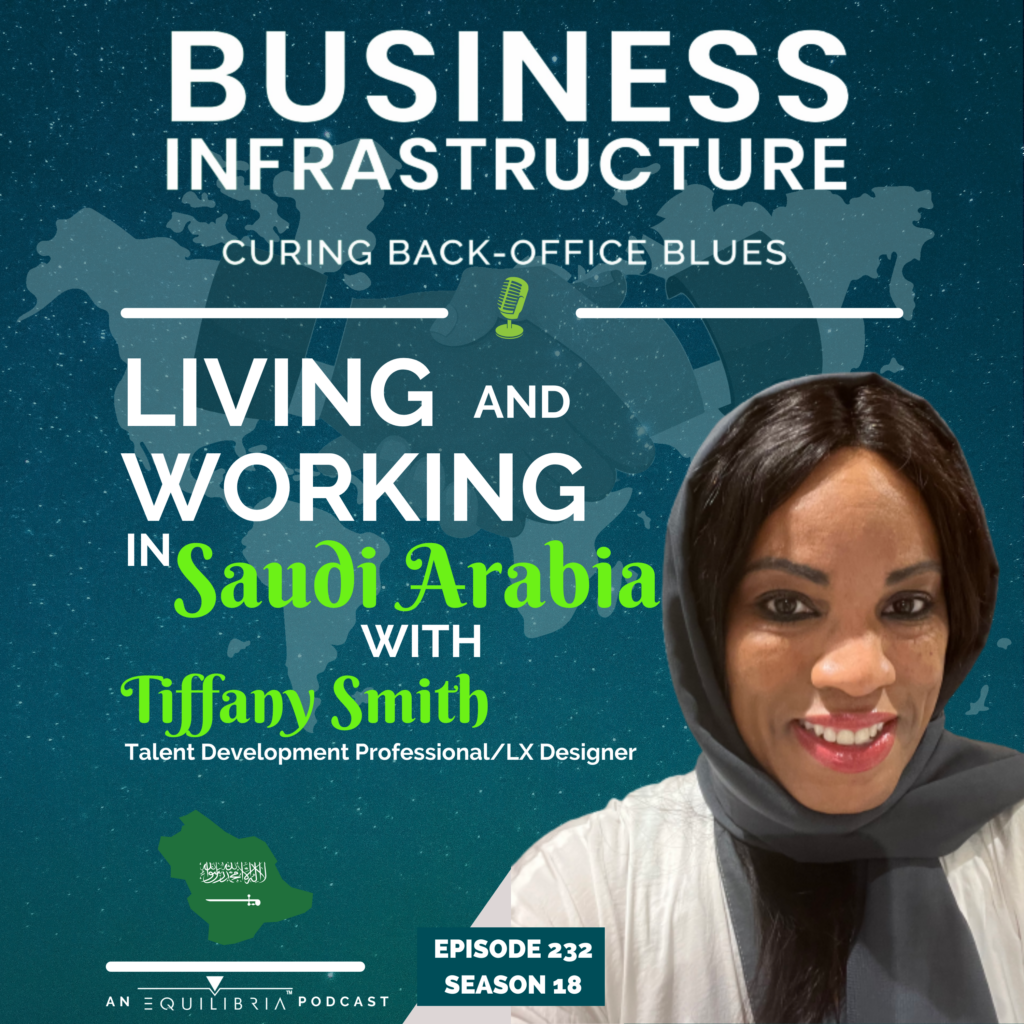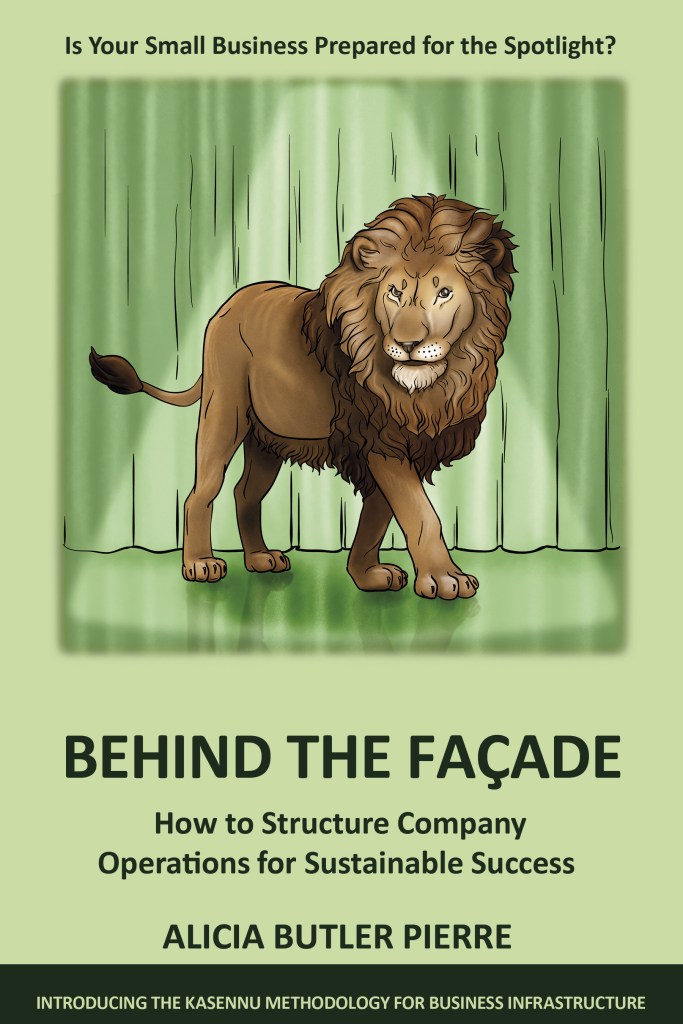Transcript
We’re crossing the Indian Ocean after leaving Australia, bracing ourselves for yet another long flight. This time we’re headed to Dhahran, a city in the Eastern province in Saudi Arabia.
I’m Alicia Butler Pierre and this is Season 18 of the Business Infrastructure podcast – the show where we share operational tips, tactics, and tools for curing back-office blues. As we get closer to Saudi Arabia, the landscape of the desert is breathtaking. Yes, it will be hot but if we wear natural cotton and linen fabrics, we’ll be fine. I’m not sure about you, but I’ve been to the Middle East before and absolutely loved the food, the architecture, and…the hospitality. In this episode, we’re going to focus more on what it’s like to live here from one of my dear friends. So, get ready for a no holds barred conversation!

This episode is brought to you by Equilibria, Inc. the company behind this podcast where we design scale-ready business infrastructure for fast-growing small businesses.
I think what happens is that you come to a point in your life, you’re young and before the world taints you, you have certain life experiences. The world’s your oyster and you’re like infallible. I’m going to do this and I’m going to make everything work, and no one’s gonna stop me except death. And even that might not stop me. And then life happens. And, when life happens, that’s when you really see what you’re made of because then you really, see how determined and how motivated you are because that’s what it really comes down to how determined are you to succeed or to rise up after you fall?”
Those are wise words from my friend, Tiffany Smith. After listening to this episode, you’ll have better context for what she just said. Tiff, as we affectionately call her, will be our guide.
This is Episode 232 – Living and Working in Saudi Arabia
My name is Tiffany Smith. I go by Tiff for short. And I am originally from Chicago, Illinois, but I am now currently living and working in Saudi Arabia in the Eastern province.
At the time of this interview, Tiff has been in Saudi Arabia for four years. So…how did someone from Chicago, a large metropolis in the midwestern part of the U.S. end up in Saudi Arabia? Turns out the answer isn’t straight and narrow, but full of interesting and surprising twists and turns.
Well, growing up in Chicago, obviously it’s cold. You get used to really dealing with the cold weather and it’s very fast paced. But it’s a beautiful city and, I really enjoy it. My first job was actually in Itasca, Illinois, which is a suburb of Chicago. At that time in which I was doing, a lot of, I.T. work, it was Cincinnati Bell Information System, CBIS. And I basically worked in quality assurance.
It wasn’t a job that brought me to Atlanta. my mother passed away in ‘94, and so I was going to move with my sister. I know this is gonna sound crazy, most people don’t do this, but I’m a very unique person. So, I said, “Okay, let’s go ahead and put a map where we wanna go because we were gonna move together.” And I pointed to Atlanta without looking. I don’t know how that happened. That’s how I ended up there, believe it or not. So, when the moving day came, I ended up moving by myself because, something had happened and my sister ended up staying, in Illinois.
And most people are like, “Well, weren’t you scared? Or what were your reservations?” But I, I think you have to take calculate risk and I was just really ready for a change. Coming from Chicago, you deal with 20 below 30 below 20, 30 inches of snow, just snow all the time. And when you grow up with that, it gets really old. So, first and foremost, what drew me to Atlanta was, hot weather. And then the second thing was all of the possibilities and opportunities. And I knew that it was a city that a lot of entrepreneurs go to.
Okay. So, you make it to the sunny South. ATL, Georgia. And what happens next, careerwise, Tiff?
Now this is where the rubber, meets the road, right? To see what you’re really made of, in your early twenties. Just like a lot of people right now, especially, the millennials and even some of the Zs that are going around being digital nomads and they’re just like, “I’m just going to live my life and I’m going to take a calculated risk.” That was kind of like I did, I, I did have a plan, even though I put my finger on the map.
I had already started networking with people there. I had started that almost probably six months in advance. I could start with networking and then moving from, networking to finding a place to live to then getting a job. I was able to find employment within probably about a month, which is pretty good. After moving there, I found a place to live within a week.
This was in the ‘90s and Tiff’s first job in Atlanta was at a call center. Nine months later she accepted a job working remotely for a tech company in Dallas, Texas. This was long before the idea of remote work would become more commonplace. Eventually she found herself back in a corporate I.T. job. By 2005, she was ready for something different.
That’s when, a lot of things start changing because I realize even though I had worked in I.T. for numerous years, I would say 15 plus, I didn’t really wanna do that anymore because I didn’t wanna be on call, you know, 24/7. I didn’t have to work like 70 hours a week, right? So, I left Scientific Atlanta and went to ADP and worked. And I was back in I.T. after I said I didn’t wanna go back into I.T. And I did that for a while and then I decided this isn’t really what I wanna do. So, I ended up going back to school, to get my masters in instructional design,
Instructional design. Can you explain that to people who are listening who may not understand what instructional design is?
Sure. I’ll give you a very easy, way to think of it. Instructional designers are people who create the word instruction, but not just instruction. They create training, they create online courses. We do eLearning courses, we do videos, we do anything that has to do with taking complex information, chunking it down to digestible bites, if you will cause we look at the cognitive load of the brain and how much a person can actually, keep in their short-term memory, before it goes into long term memory. So, we take all of this information and we put it into a learning experience and that’s how you basically get your training.
Listening to that explanation of instructional design might lead you to think that it’s a natural progression from the work Tiff did in I.T. Turns out that isn’t true.
Being that I came from I.T. I was a left-brain person going into instructional design, even though it is technical, it also, demands creativity because it has so many different facets of it. You really need to know your audience when you’re developing training.
So, I think for me, coming from such a technical arena and a background, the creative side was challenging for me, believe it or not. I always looked at things, I guess you could say linear. I was forced to have to grow outside the box and say, “Okay, it doesn’t have to be linear,” and in fact can be 3D or 2D or what have you.
Despite the mental paradigm shift required to go from I.T. to instructional design, Tiff had found her passion. And this passion is what ultimately led her to Saudi Arabia.
It was the right fit. It’s kinda of like when you get married, Why did I say yes? I received an email from a recruiter. And they asked, “Would you be interested in working a single expat position in the Middle East?” And when I saw the Middle East, I was thinking Dubai.
Who wouldn’t wanna go to Dubai, right? I sent in the information, they liked what they saw, they pretty much booked me for an interview. Of course, this didn’t happen as quick as I’m saying it. It started early in 2017, like February is when I first received the invite from the LinkedIn recruiter. And then we did some, communication exchange. It was actually March and then I went in for a face-to-face. From April till September, that’s how long it took until I received my offer.
And it ended up being an offer Tiff couldn’t refuse. By December, 2018 she found herself preparing to move across the world – an experience that would forever change her life. How’d she do it? What did it take to leave her life in America behind and venture into the unknown and unfamiliar? She’ll give us all the details and offer some resources along the way. That’s coming up after the break.
Is your business growing faster than you can keep up with? Do you need to grow your team but aren’t sure where to start let alone who to hire first? And what about processes? Do you have any of them documented so that people know what work to do and how to do it?

If you own a fast-growing small business and want a company that can consistently operate without your daily presence, then the Smooth Operator course is for you. It’s an online introductory course on business infrastructure that can provide you with proven tools, tactics, and techniques to calm the chaos and restore order. Go to SmoothOperator.courses to learn more. That’s SmoothOperator.courses.
Welcome back. Before the break, Tiff Smith, an instructional designer and self-proclaimed lifelong learner shared the story of how she went from growing up in Chicago, known as the Windy City, to Saudi Arabia – a country with a majority desert landscape. How’d she do it? What was the process? Here’s Tiff…
So, for me, it was really smooth process because the company took care of all of that cause otherwise if you have to go for a visa, obviously that can take a very, very long time depending on the country you’re going to. My company pretty much did everything, from my passport, my visa, all of that. And it took about 90 days from the time that I was confirmed with everything to the time I left.
Okay. And clearly there’s some things you have to do to prepare to leave. So, I’m curious, Tiff, when you set out to actually go across the world to Saudi Arabia, did you leave thinking you might not come back? Did you keep your house?
So, I first should tell you this, never move someplace based on a movie cause when they told me it would be Saudi Arabia, I said, “Oh yeah, that’ll work.” Because I remember this movie called Lace with Phoebe Cates from the Gremlins, and I love that movie.I’m a very different breed. I tell you this to give you a good laugh.
Going back to your question, yes, there’s a lot that goes into preparing. It’s gonna depend on if you’re married, if you have kids, if you’re single, in my case I’m single so that’s even in some respects I think harder. But some people say that, you know, when you’re married and you have kids, it’s harder because you have a family that you have to move which I can see that could be more challenging. But as a single person’s perspective, I had to look at, I had just recently bought a house and I was like, “Oh my gosh, what am I gonna do in my house?”
So, I did not sell it. I did keep it and I’m grateful that I did. but what you find out, when I went over there, I basically had systems in place and I had a really good support group, my tribe. And I made all of my, power of attorneys and, you know, these are all things that you have to think about. And then I also had to set up a time for people to go in and maybe clean up a little bit. Also, when you leave your utilities on, you have to make sure, especially water, go in, run it at least once a month.
Flush the toilets, all of these things. And you’re just like, wow, you don’t know this cause you’re living in a house. But a house should not sit empty without these things being done. So, I was very blessed that I had people, that were gonna help me. And to this day, I’m paying them now. It didn’t start out that way, but you know, you have to be fair. And I don’t mind because they do a good job.
Something else that Tiff did was convert her home into a smart house.
So instead of me having to call a friend saying, “Can you please go over and turn off the air condition? Can you please turn on the heat?” All these different things that can go possibly go wrong when you’re at home living in the house, now you have to manage it from two continents away.
I made my house a smart house so that I could literally log in from anywhere, my phone, my computer, and see what I need to see and say, “Why is that there?” So, it helps because if you don’t have systems in place and you don’t have a tribe or support group, it’s going to make it really tough
because there’s just things that you can’t do.
As much time and money as Tiff invested in her smart home, as she soon discovered, she still had her work cut out for her.
The other thing that is really important as well is America is not very friendly when it comes to international phone numbers. Now if you’re talking about the IT companies like Google, Apple, Microsoft, of course, but I’m speaking more towards banks, you know, just your day-to-day things – your credit cards, stuff like that.
Because what happens is that when I came over here, I had, a US number obviously, and I said, “Okay, you know what? I am not going to pay this.” I was actually with Verizon, and they were gonna charge like a ridiculous amount of money, to add an international package. Why pay that when you can get a cheaper one here? So, I canceled my US number after I was here for six months, and as soon as I canceled it, I was locked out of my bank accounts.
Ooh!
Could not get into because they couldn’t verify me through two-way verification, and they weren’t gonna use an email. It was so frustrating. And I was on the phone with them like almost every day. They’ve gotten a little bit better, but it’s still something you have to be very cognizant of because they cannot enter an international number. And then what happens with the credit cards in your bank is that they have like, okay, if you’re in the military, it’s fine, but if you’re an expatriate or an expat, as we call ourselves for short. It’s like, we’re not recognized. They’re like not gonna take an international number. It has to be a US number.
And so, it presents a whole bunch of problems. And, I had to learn the hard way. mail’s a whole nother story as well. global mailboxes all over the place. And it just depends on which one you wanna use. There’s Aramex, which is, shop and ship, that’s what they’re called. They have different stores that you obviously can shop from and then you can ship, and they’re actually gotten much better. But when I first got here, it, it was like hit or miss receiving what you ordered. So that was a little discouraging, but it, it’s much better now.
They now have Amazon here, which is really great. they have Amazon.sa as well as.com. So, some of the things that you can order off Amazon.sa, you can get the same day, but it wasn’t like that, up until probably like, right after covid. So, there’s all these things that you don’t know about, that you have to plan for. another thing is that when you go over, some countries won’t allow for WhatsApp or Facebook Messenger. So, then you have to look at what are their laws for VPNs, which is a virtual private network. It’s so many things. It would take a long time to go over.
Yeah, yeah. How would you even find that out in advance whether or not you could use an app like, you know, WhatsApp or Facebook Messenger?
You can usually Google it and see if you’re traveling to a country and, you wanna see what type of internet service they have. I have a friend who’s an expat in Shanghai, so when she went over there, she had to actually look and see, what’s gonna be blocked and what’s not. It’s public knowledge. they’ll let you know if you’re able to have, access to these different apps over here.
I’m glad you brought that up because it’s not something that I know I would’ve intuitively thought to research before relocating. So, what you’re describing, Tiff, is really business infrastructure. You’ve talked about people, processes and tools and technologies. You’ve already described having your tribe, those people around you who can check on things while you’re away and having these different systems in place to keep everything afloat as you live between two different countries. And as far as the different tools…communicating with your bank, being able to receive and send mail working out things with your credit card companies.
That’s very crucial that you do that, because what happens is that if you do not go into your bank platform as well as your credit cards and let them know that you’re traveling overseas, as soon as you try to use a credit card over here, it will not go through and they will flag it, and then you’ll have to call in. I use Skype. Skype allows me to call landline and mobile numbers. And I pay basically $36 or $32 a year, and that’s a godsend. When the bank had locked me out, can you imagine me calling every day for six months without Skype?
It’s a good thing Tiff has a background in I.T. It certainly comes in handy in the situations she described. She mentioned Skype, WhatsApp and Facebook Messenger. There’s also another instant messaging app called Telegram. She’s very clear on the importance of doing your research to learn which of these communication tools is actually available in the country you’re considering traveling to or living in.
You’ll notice when you travel over to different countries, that WhatsApp, these different apps are like the main communication, like Brazil, south America use WhatsApp, Africa uses, WhatsApp, obviously the Middle East uses WhatsApp, and it’s like your lifeline because everything is done on WhatsApp. If you’re scheduling a pickup for something, if you’re wanting to buy something to eat, if you’re trying to get directions or schedule a taxi or everything is done through WhatsApp. And it’s all done texting not by talking. So, you better become a very good texter.
As we start to wind up our conversation with Tiff, I realized we hadn’t yet discussed one of the most obvious differences between living in a country like America vs. Saudi Arabia, from a cultural perspective. I asked about some of the myths and misconceptions about living in a predominantly Muslim country as a single woman. Has she had any issues?
Well, honestly, I know what a lot of people think, but actually I didn’t experience that. It’s a very safe country. I feel safer here than I do in my own country at home. And people are like, “Wow!” I do, because I can go running at 3:00 AM in the morning and I’m definitely not gonna do that at home, . And then you say, “Well, why do you run at 3:00 AM in the morning?” It’s because the heat can get up to 130, 140 degrees Fahrenheit, so you wanna beat the sun. I woke up this morning and it’s 80 degrees at 3:00 AM.
So, it’s safe. I feel respected. I have not had any issue. everyone that I have met has been very care. I’ve made some really good friends, people who I would even go as far as calling them like my, Saudi sister or what have you, because we just got to be really, really close. Yes, the cultures are very different. Yes, wearing the abaya was kind of challenging when I first got here, but MBS in 2018 said that as long as you dress conservatively, you can go out. And, and pretty much that has been the case. So, what people don’t realize is that all of us probably receive some information from the media and we, go through our scan of our environment and our perceptions, and then we make our opinions.
There are a lot of single women over here, not just only from the US but from all over the world. A lot of people from the UK, a lot of people from Europe, and at the end of the day, we’re just all really people. I have not experienced anything but good friendships, good conversation. All I can say is it is a welcoming culture. the one friend that I made when I first got here was such a blessing because I didn’t realize how cold the desert gets. And it actually even snows in Tabook. so, when I got here, I didn’t bring a jacket cause I was like, “Oh, I’m from Chicago. How cold can a desert be?” Well, let me tell you, it gets cold!
And I’m talking from a Northerner’s perspective. Anyways, this person I met, she took me to a store and helped me get some clothes and got me a coat and everything and became my best friends. And to this day we’re still very, very close. She’s unfortunately moved to another city in Saudi, but, we still keep in touch. You know, how they say southern hospitality? And I was expecting that when I had moved to Atlanta, but I didn’t receive the southern hospitality, but there is definitely Saudi hospitality, at least from my perspective in my experience.
There are some things that you do have to get used to like, shopping can be challenging cause sometimes you can’t try on the clothes, but you know, you, it’s actually, when you think about it, especially during covid, it’s sanitary, right?
But can you return things if it doesn’t fit?
Yep. But you really have to know your size.
Well, that’s good to know. Awww man, we can go on forever talking to Tiff, but unfortunately, we have to wrap up. So, Tiff, thank you so much for taking time to speak with me and this community of Smooth Operators on the Business Infrastructure podcast. I’m so proud of you and even prouder of our friendship.
Well, thank you for having me, Alicia. It’s always pleasure speaking with you.
We have a saying in the world of process improvement and operational excellence – go to the Gemba! It’s an expression rooted in the idea of going to see things for yourself. The best way to find out about a country like Saudi Arabia is to visit. Now you know someone there – be sure to connect with Tiff on LinkedIn and check out the resources she recommends you research before relocating or doing business there. Links are available at BusinessInfrastructure.TV.
Tiff has arranged for a dinner for us with her tribe that she mentioned earlier in this episode. She’ll take us to the airport on tomorrow morning. With all the traveling we’ve been doing, I thought she was our last stop on the tour, but we actually have one more country to visit! And it will be well worth the wait. I promise. Which country is it? Well, you’ll have to come back to the show to find out!

Thank you for tuning in! If you enjoyed this episode, then please subscribe and leave a five-star rating and review.
“Believe some of what you see and none of what you heard.” Remember, Tiff and I are here to support you if you want to know more about traveling to the Middle East to live and/or conduct business there so stay focused and be encouraged. This entrepreneurial journey is a marathon and not a sprint.
This episode was written, produced, and narrated by me, Alicia Butler Pierre. Audio editing by Olanrewaju Adeyemo. Original score and sound design by Sabor! Music Enterprises.
This is the Business Infrastructure – Curing Back-Office Blues podcast.












